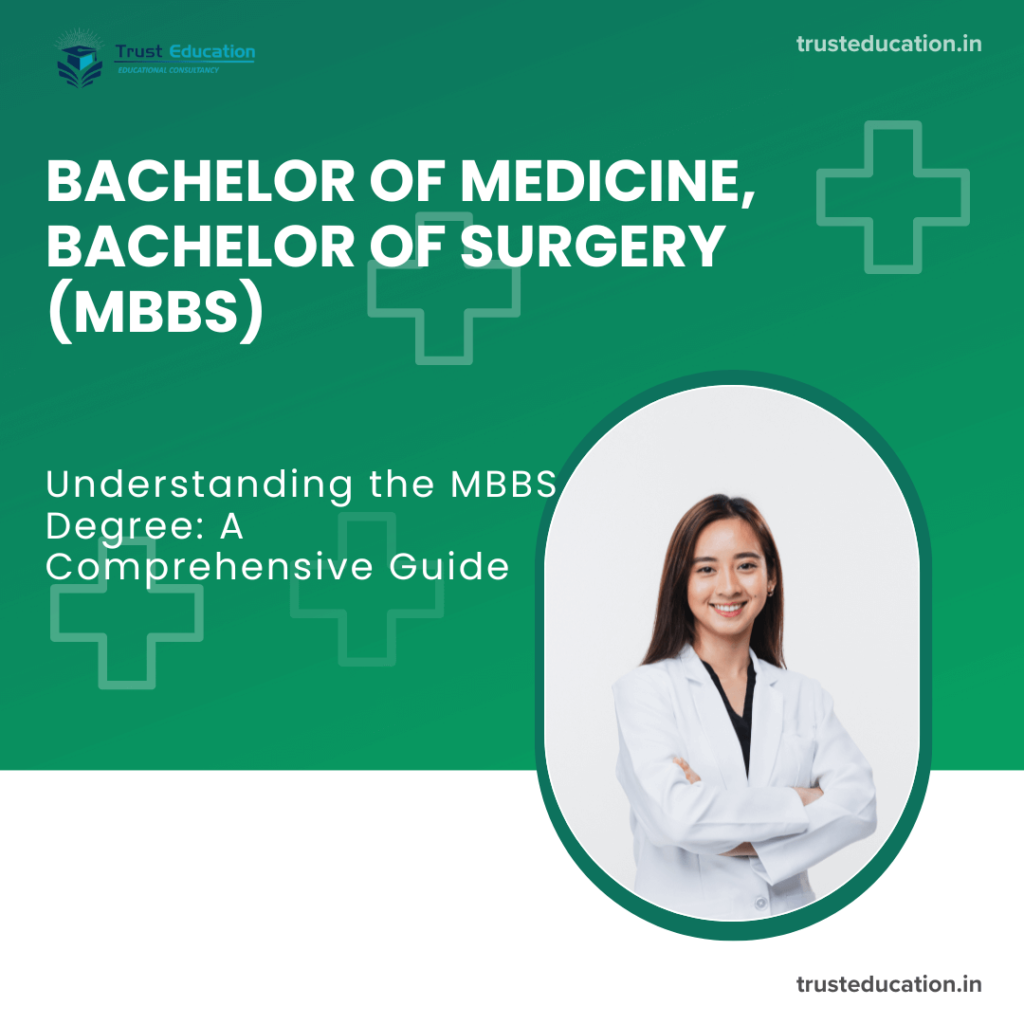
Understanding the MBBS Degree: A Comprehensive Guide
The Bachelor of Medicine, Bachelor of Surgery (MBBS) is one of the most sought-after degrees for students aspiring to become doctors.
As the primary degree for entering the medical profession, an MBBS equips students with the foundational knowledge and clinical skills necessary to diagnose and treat illnesses, perform surgeries, and contribute to the healthcare sector.
This guide will provide an in-depth look into the MBBS program, covering everything from admission requirements to career prospects.
What is an MBBS?
MBBS stands for “Bachelor of Medicine, Bachelor of Surgery.” It is an undergraduate medical degree offered by universities worldwide.
The degree is divided into two parts: Medicine (the study of general medicine) and Surgery (the study of surgical procedures).
Typically, the MBBS program spans five to six years, including a mandatory internship or clinical rotation year.
The curriculum is designed to give students a broad understanding of human anatomy, physiology, pathology, pharmacology, microbiology, and clinical practice.
Admission Requirements for MBBS
Eligibility Criteria
To pursue an MBBS degree, candidates must meet specific eligibility criteria, which may vary depending on the country or institution.
Generally, students must have completed their higher secondary education (12th grade) with a strong emphasis on science subjects, particularly Biology, Chemistry, and Physics.
Most countries require students to have a minimum percentage in their qualifying exams (usually around 50-60%) to be eligible for MBBS programs.
Entrance Examinations
In addition to meeting the academic criteria, students are often required to clear entrance examinations.
These exams are designed to assess the candidate’s aptitude for the medical profession.
Some of the most common entrance exams include:
- National Eligibility cum Entrance Test (NEET): Conducted in India, NEET is a mandatory exam for admission to MBBS programs in government and private medical colleges.
- MCAT (Medical College Admission Test): Used primarily in the United States and Canada, the MCAT assesses the knowledge and critical thinking skills necessary for medical school.
- UKCAT (UK Clinical Aptitude Test): In the United Kingdom, students must take the UKCAT to gain entry into medical schools.
MBBS Curriculum and Structure
Pre-Clinical Phase
The MBBS curriculum is typically divided into two phases: Pre-Clinical and Clinical. The Pre-Clinical phase, usually spanning the first two years, focuses on the basic sciences, laying the groundwork for understanding the human body and its functions.
Key subjects during this phase include:
- Anatomy: The study of the structure of the human body.
- Physiology: Understanding the normal functioning of the human body.
- Biochemistry: The chemical processes within the body.
- Pharmacology: The study of drugs and their effects on the body.
- Pathology: The study of diseases and their effects on the body.
- Microbiology: The study of microorganisms and their role in health and disease.
Clinical Phase
The Clinical phase typically covers the next three years of the MBBS program. During this period, students move from theoretical knowledge to practical application.
This phase includes clinical rotations, where students gain hands-on experience in different medical specialties, such as:
- Internal Medicine: Managing a wide range of adult health conditions.
- Surgery: Performing surgical procedures and pre- and post-operative care.
- Pediatrics: Healthcare of infants, children, and adolescents.
- Obstetrics and Gynecology: Women’s health, including pregnancy and childbirth.
- Psychiatry: Diagnosing and treating mental health disorders.
- Orthopedics: Treatment of musculoskeletal system disorders.
- Community Medicine: Public health and preventive medicine.
Internship/Housemanship
After completing the academic portion of the MBBS, students must undertake a mandatory internship, also known as housemanship.
This usually lasts one year and involves working under the supervision of experienced doctors in various departments of a hospital.
The internship allows students to apply their knowledge in real-world settings, enhancing their clinical skills and professional competence.
Career Opportunities After MBBS
Postgraduate Specializations
After earning an MBBS degree, many graduates choose to pursue postgraduate studies to specialize in a particular field of medicine.
Some of the popular specializations include:
- MD (Doctor of Medicine): Specializing in areas such as Internal Medicine, Pediatrics, or Radiology.
- MS (Master of Surgery): Focusing on surgical specialties such as Orthopedics, General Surgery, or Neurosurgery.
- DNB (Diplomate of National Board): Another postgraduate option that is equivalent to an MD or MS and recognized by the Indian government.
Career Paths in Medicine
An MBBS degree opens up a wide range of career opportunities. Graduates can choose to work in:
- Hospitals: Serving as doctors, surgeons, or consultants in various departments.
- Private Practice: Starting a clinic and providing healthcare services to the community.
- Academia: Teaching and conducting research in medical colleges and universities.
- Public Health: Working with government or non-governmental organizations to improve public health outcomes.
- Medical Research: Contributing to advancements in medicine by working in research institutions or pharmaceutical companies.
- Healthcare Administration: Managing hospitals, clinics, or healthcare organizations.
International Opportunities
MBBS graduates can also explore international career options, as the degree is recognized in many countries.
To practice medicine abroad, however, graduates may need to clear licensing exams specific to the country where they wish to work.
For instance, to practice in India you need to clear MCI examination. To practice in the United States, an MBBS graduate must pass the United States Medical Licensing Examination (USMLE).
Challenges and Rewards of an MBBS Career
Challenges
The journey to becoming a doctor through the MBBS program is rigorous and demanding. Some of the challenges faced by MBBS students and professionals include:
- Intense Study Load: The extensive curriculum requires long hours of study and practical training.
- High Competition: Admission to MBBS programs is highly competitive, and the pressure continues throughout the course.
- Emotional and Physical Stress: Dealing with patients’ suffering and critical situations can be emotionally taxing.
- Continuous Learning: Medicine is a field that constantly evolves, requiring doctors to stay updated with the latest advancements.
Rewards
Despite the challenges, a career in medicine is highly rewarding.
Some of the key rewards include:
- Respect and Recognition: Doctors are highly respected in society for their role in saving lives and improving public health.
- Job Stability: The demand for healthcare professionals ensures job stability and security.
- Personal Fulfillment: The ability to help and heal others brings immense personal satisfaction.
- Financial Rewards: While the initial years may involve modest earnings, experienced doctors can earn a lucrative income.
Conclusion
Pursuing an MBBS degree is a challenging but highly rewarding journey. It offers a unique opportunity to make a significant impact on people’s lives and contribute to society’s well-being.
With a well-rounded curriculum that combines theoretical knowledge with practical experience, an MBBS degree lays the foundation for a fulfilling career in medicine.
Whether you choose to specialize further or enter the workforce immediately after graduation, the skills and knowledge gained during your MBBS will serve you well throughout your medical career.
